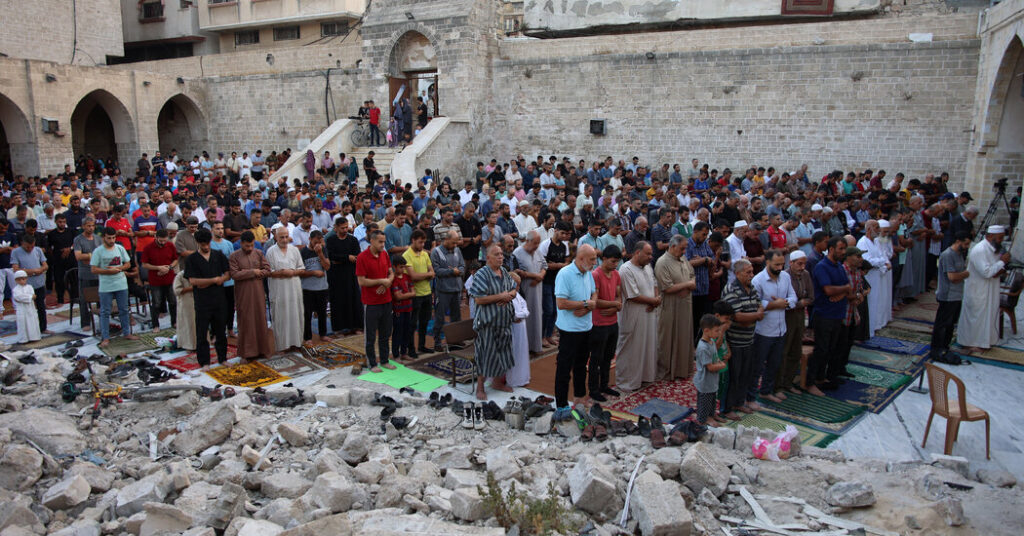The news, released for the first time through the Israeli military’s English and Arabic channels on Sunday, seemed unexpected: The military would “pause” fighting on a key humanitarian aid corridor in southern Gaza during daylight hours until further notice.
While there was some confusion as to the scope of the suspension, clarification soon followed, this time in Hebrew and seemingly for domestic consumption. The change does not mean a cessation of fighting in southern Gaza, the statement said, adding that fighting continued in the southernmost city of Rafah. Military officials said the daily pause was simply to facilitate increased distribution of food aid in Gaza, where international organizations have issued dire warnings about hunger in the region.
The bizarre messaging became even stranger when the government said Prime Minister Benjamin Netanyahu only learned of the military’s plans from news reports and expressed disapproval.
But analysts said the prime minister was likely aware of the plan and that each announcement was tailored to different audiences. The erratic statements appeared to reflect the competing pressures Netanyahu faces as he weighs the demands of the Biden administration and others around the world against those of his own hawkish government. His far-right coalition partners oppose any concessions in Gaza and he relies on their support to stay in power.
The new policy around the humanitarian corridor, which the military said has suspended fighting from 8 a.m. to 7 p.m. daily, took effect on Saturday, according to military officials. But Mr Netanyahu suggested he was not informed of the plans until Sunday morning.
“This is typical Bibi,” said Amos Harel, a military analyst at the left-wing Haaretz newspaper, referring to Mr Netanyahu by his nickname. Like other experts, he said the news was unlikely to come as a complete surprise to him, even if military commanders did not brief him on the exact timing of what they called the tactical change.
“He wears a mask in every situation,” Harrell said in an interview. “To the Americans, he needs to show that he is doing more to get aid. To the Israeli audience, he can say ‘I don’t know,’ and then engage in plausible deniability.”
An anonymous government official said in a statement on Sunday that when Netanyahu learned of the humanitarian suspension, he considered it unacceptable. The statement added that the prime minister was later assured that the military’s plans for the battle for Rafah had not changed.
Shani Sasson, a spokesman for Cogat, the Israeli agency that oversees policy in the Palestinian territories and liaises with international organizations, said the move was intended to help clear a backlog of more than 1,000 trucks that had been inspected by Israel and were waiting .
“We are asking aid organizations to come and collect and distribute aid,” Ms Sassen said. “It’s up to them.”
The military’s move coincides with the start of the Muslim holiday of Eid al-Adha and uncertainty over the fate of Israel’s proposed ceasefire with Hamas, which would include exchanging Palestinian prisoners for hostages. Officials say Hamas is demanding some unworkable changes to proposals backed by the Biden administration and endorsed by the U.N. Security Council.
The “tactical pause” also comes as Israel awaits another international report on food insecurity in Gaza that is expected to be released this month. A previous report in March warned that half of Gaza’s population faced “catastrophic” food insecurity and looming famine.
Mr Netanyahu and his defense minister, Yoav Galante, also face the threat of arrest on war crimes charges at the International Criminal Court in The Hague. They were accused of using hunger as a weapon of war.
Israel describes Rafah as the last bastion of Hamas’ organized forces and sees the military operation there as the last major step in the war. The military now controls Gaza’s southern border corridor with Egypt, which has long been a main route for weapons smuggling into the region.
Israelis are increasingly questioning where the war will go and when it will end. Costs are rising for both parties. At least 10 Israeli soldiers were killed in fighting this weekend, including an 11th soldier who died from injuries sustained days earlier.
A total of more than 300 Israeli soldiers have been killed in fighting since a Hamas-led attack on southern Israel on Oct. 7 killed about 1,200 people, sparking the war.
More than 37,000 Palestinians have been killed in the war so far, according to Gaza’s health ministry, which does not distinguish between combatants and civilians.
In an interview with Israel’s Channel 12 this weekend, Gadi Eisenkot accused Mr Netanyahu of putting his own political needs first.
Eisenkot said the influence of one of Netanyahu’s far-right coalition partners, National Security Minister Itamar Ben Gvir, was always present in discussions in the war cabinet, even though Ben Gvir was the national Minister of Security.
Mr Ben-Gevir and far-right Finance Minister Bezalel Smotrich have publicly criticized the military leadership during the war and vowed to reach a ceasefire before Hamas is completely destroyed if Mr Netanyahu agrees , they would topple Mr. Netanyahu’s government—a goal that many experts say is unattainable.
As expected, Ben-Gwere was quick to attack the military’s announcement of a humanitarian pause in a social media post on Sunday, denouncing it as a “crazy and delusional approach” and adding that the decision was “evil” The fool” “must not continue in his position.
Mr Ben-Gwell did not specify who he was referring to.
Gabby Sobelman Contributed reporting.

